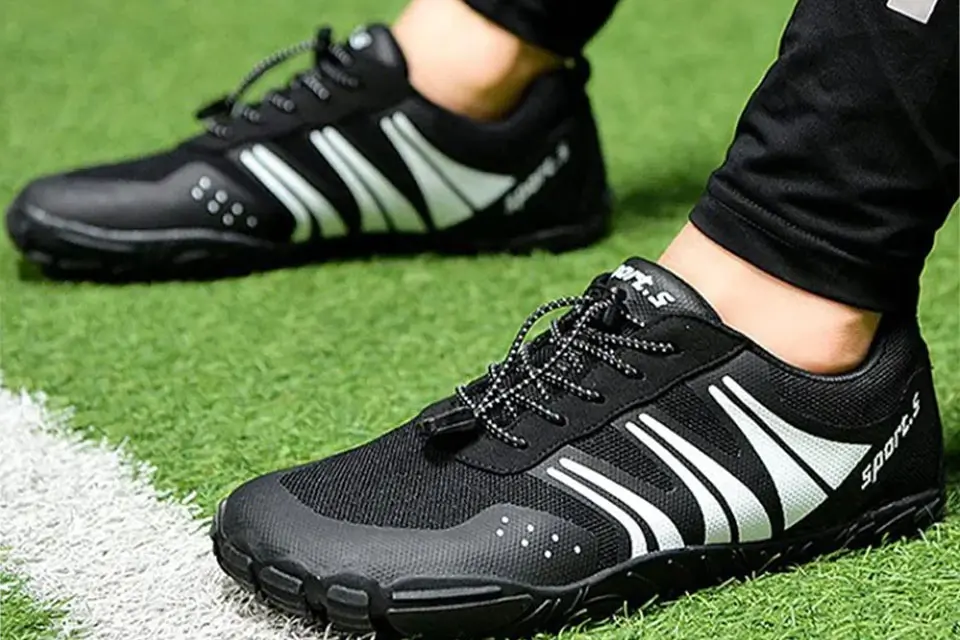
Is Barefoot Better Than Shoes
In recent years, there’s been growing interest in barefoot movement and minimalist barefoot shoes as people seek more natural ways to move and strengthen their feet. Let’s explore whether going barefoot might actually be better than wearing conventional shoes.

Table of Contents
The Natural Design of Human Feet
Our feet are remarkable structures, containing:
- 26 bones
- 33 joints
- Over 100 muscles, tendons, and ligaments
- Thousands of nerve endings
The human foot evolved over millions of years to be both strong and sensitive, allowing our ancestors to move efficiently across varied terrain. Modern conventional shoes, while offering protection, may actually interfere with this natural design.
The Problems with Traditional Shoes
Traditional footwear often comes with several limitations:
- Restricted toe movement due to narrow toe boxes
- Reduced sensory feedback from thick, cushioned soles
- Altered walking gait from elevated heels
- Weakened foot muscles from excessive support
These issues can lead to various foot problems and affect our overall biomechanics. That’s why many people are turning to barefoot-style footwear that better mimics natural foot movement.
Benefits of Going Barefoot
Research suggests several advantages to barefoot movement:
- Enhanced Proprioception
- Better awareness of foot position
- Improved balance and stability
- Strengthened Foot Muscles
- Natural arch support development
- Increased foot flexibility
- Improved Walking Mechanics
- More natural gait pattern
- Better weight distribution
- Better Posture
- Aligned spine positioning
- Reduced stress on joints
The Role of Modern Barefoot Shoes
While completely barefoot movement isn’t always practical, modern barefoot shoes offer a compelling compromise:
| Feature | Benefit |
|---|---|
| Zero Drop | Promotes natural foot alignment |
| Wide Toe Box | Allows natural toe spread |
| Minimal Cushioning | Enhances ground feel |
| Flexible Sole | Enables natural foot movement |
Transitioning to Barefoot Movement
Making the switch requires patience and proper progression:
- Start with short periods
- Gradually increase duration
- Pay attention to body feedback
- Consider starting with minimalist footwear
Impact on Different Activities
Barefoot movement can benefit various activities:
- Running: Improved form and reduced impact
- Walking: Better ground sensation and balance
- Strength Training: Enhanced stability and power transfer
- Daily Activities: More natural movement patterns
Scientific Evidence
Research findings support barefoot benefits:
“Studies show that barefoot activity can improve balance, proprioception, and foot mechanics.” – Journal of Foot and Ankle Research
Common Concerns Addressed
Here are some frequently asked questions:
What about protection from sharp objects?
While protection is important, modern barefoot shoes offer adequate protection while maintaining ground feel.
Won’t my feet get cold?
There are barefoot-style boots and winter options available for cold weather.
Is barefoot movement suitable for everyone?
While beneficial for many, some medical conditions may require specialized footwear. Consult a healthcare professional.
Will my feet hurt when transitioning?
Some initial discomfort is normal as feet strengthen. Gradual transition is key.
Special Considerations
Different groups may need specific approaches:
- Children: Natural foot development is crucial
- Athletes: Sport-specific requirements
- Elderly: Balance between protection and sensation
- Office Workers: Professional yet minimal options
Conclusion
While completely barefoot movement isn’t always practical in modern society, the evidence suggests that minimizing artificial support and allowing natural foot function has numerous benefits. The key is finding the right balance between protection and natural movement, which is where quality barefoot shoes can play a crucial role.Whether you’re an athlete, casual walker, or someone interested in natural movement, exploring barefoot options could lead to stronger, healthier feet and improved overall movement patterns. Remember to transition gradually and listen to your body’s feedback throughout the process.
